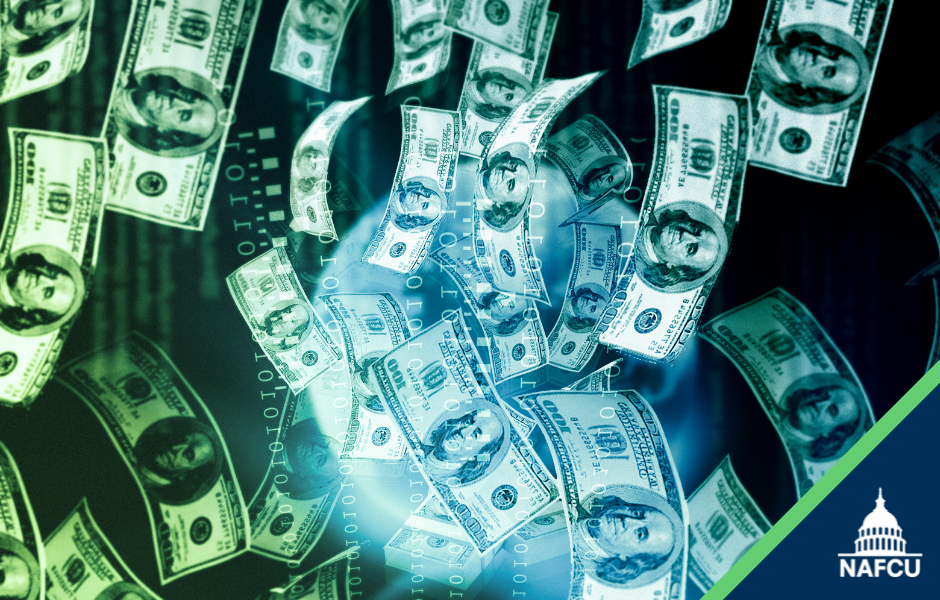Newsroom
Legislation introduced proposing Treasury issue digital dollar
 Rep. Stephen Lynch, D-Mass., Monday introduced legislation that would require the U.S. Treasury Department to issue a digital version of the U.S. dollar. Lynch is the Chairman of the House Financial Services Committee’s Task Force on Financial Technology. The legislation, the Electronic Currency and Secure Hardware (ECASH) Act. establishes “e-cash” or a digital dollar that could be stored and transferred via encrypted hardware devices that would maintain anonymity and privacy. Unlike the Federal Reserve’s proposed framework for a central bank digital currency (CBDC) that calls for transactions to be recorded on a public ledger or blockchain, Lynch’s ECASH Act transactions would rely on hardware to better preserve anonymity for users.
Rep. Stephen Lynch, D-Mass., Monday introduced legislation that would require the U.S. Treasury Department to issue a digital version of the U.S. dollar. Lynch is the Chairman of the House Financial Services Committee’s Task Force on Financial Technology. The legislation, the Electronic Currency and Secure Hardware (ECASH) Act. establishes “e-cash” or a digital dollar that could be stored and transferred via encrypted hardware devices that would maintain anonymity and privacy. Unlike the Federal Reserve’s proposed framework for a central bank digital currency (CBDC) that calls for transactions to be recorded on a public ledger or blockchain, Lynch’s ECASH Act transactions would rely on hardware to better preserve anonymity for users.
Citing the rapid expansion of digital payment and currency technologies across the world, Rep. Lynch stated, “it is absolutely critical for the U.S. to remain a world leader in the development and regulation of digital currency and other digital assets.”
The introduction of the ECASH Act comes on the heels of President Joe Biden’s recent Executive Order on Ensuring Responsible Development of Digital Assets, which indicates that exploring a U.S. CBDC remains a high priority for the Administration and requires a host of agencies to participate in an interagency process to determine whether a CBDC has merit. The association has shared an Insights Post on the digital assets executive order and a Regulatory Alert on the Federal Reserve’s CBDC discussion paper, where NAFCU Regulatory Affairs Counsels Dale Baker and Senior Counsel for Policy and Research Andrew Morris break down the potential impacts on credit unions.
NAFCU will continue to engage Congress, the Treasury Department, the NCUA, and other federal financial regulators to call for credit unions to be granted the ability to engage with digital assets on equal footing with banks.
Share This
Related Resources
Add to Calendar 2024-06-26 14:00:00 2024-06-26 14:00:00 Gallagher Executive Compensation and Benefits Survey About the Webinar The webinar will share trends in executive pay increases, annual bonuses, and nonqualified benefit plans. Learn how to use the data charts as well as make this data actionable in order to improve your retention strategy. You’ll hear directly from the survey project manager on how to maximize the data points to gain a competitive edge in the market. Key findings on: Total compensation by asset size Nonqualified benefit plans Bonus targets and metrics Prerequisites Demographics Board expenses Watch On-Demand Web NAFCU digital@nafcu.org America/New_York public
Gallagher Executive Compensation and Benefits Survey
preferred partner
Gallagher
Webinar
Add to Calendar 2024-06-21 09:00:00 2024-06-21 09:00:00 The Evolving Role of the CISO in Credit Unions Listen On: Key Takeaways: [01:30] Being able to properly implement risk management decisions, especially in the cyber age we live in, is incredibly important so CISOs have a lot of challenges here. [02:27] Having a leader who can really communicate cyber risks and understand how ready that institution is to deal with cyber events is incredibly important. [05:36] We need to be talking about risk openly. We need to be documenting and really understanding what remediating risk looks like and how you do that strategically. [16:38] Governance, risk, compliance, and adherence to regulatory controls are all being looked at much more closely. You are also seeing other technology that is coming into the fold directly responsible for helping CISOs navigate those waters. [18:28] The reaction from the governing bodies is directly related to the needs of the position. They’re trying to help make sure that we are positioned in a way that gets us the most possibility of success, maturing our postures and protecting the institutions. Web NAFCU digital@nafcu.org America/New_York public
The Evolving Role of the CISO in Credit Unions
preferred partner
DefenseStorm
Podcast
AI in Action: Redefining Disaster Preparedness and Financial Security
Strategy
preferred partner
Allied Solutions
Blog Post
Get daily updates.
Subscribe to NAFCU today.
